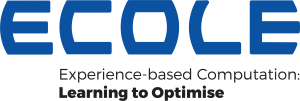Ecole
Learning to Optimise
ECOLE, is an Innovative Training Network (ITN) for early stage researchers (ESRs) coordinated by the University of Birmingham. It is based on novel synergies between nature inspired optimisation and machine learning. The training programme will be targeted at the automotive industry, but the skill set of the early-stage researchers (ESRs) will be equally valuable to other fast-moving, innovative industries. This four year programme will yield a new generation of high achieving, early stage researchers who will be provided with the transferable skills necessary for thriving careers in emerging and rapidly developing industrial areas.
ECOLE is the first project of its kind in terms of studying Learning to Optimise systematically. It aims explicitly to understand and characterise “experience” in engineering optimisation and apply such abstracted experience to optimise different, but related, engineering problems. It aims at solving a series of related optimisation problems, instead of treating each problem instance in isolation. In order to study these research issues synergistically, 8 different ESRs are employed to tackle different aspects of the whole research challenge. This report details the progresses made in the ECOLE project in its first year although the ESRs have been in place for only half a year (approximately) according to proposed plan.
Research aim
The research aims of ECOLE include shortening the product cycle, reducing the resource consumption during the complete process and creating more balanced and innovative products. Instead of just developing technologies to solve a given optimisation problem, it will take a bold step forward and propose to optimise automatically across problems. Referring to knowledge, skill, and practice derived from problem solving processes in time, the experience of optimising one product or process will be learned and transferred automatically to solve other optimisation problems.
ECOLE is the first project of its kind in terms of studying Learning to Optimise systematically. It aims explicitly to understand and characterise “experience” in engineering optimisation and apply such abstracted experience to optimise different, but related, engineering problems. It aims at solving a series of related optimisation problems, instead of treating each problem instance in isolation. In order to study these research issues synergistically, 8 different ESRs are employed to tackle different aspects of the whole research challenge.
Purpose
ECOLE is needed in response to an acute shortage of human experts with sufficient skills in tackling industrial challenges in a holistic manner. A holistic view and approach are needed as the engineering process has profoundly changed in the last ten years. Many tools from computer aided design, computer aided engineering, and enterprise resource management have been integrated into product lifecycle management frameworks used in the automotive industry with the aim to enable a holistic view on the production processes. This will allow for the early embedding of constraints and criteria that occur late in the development chain or even the complete lifecycle of the product.
Download the ECOLE Website About Page as a PDF


